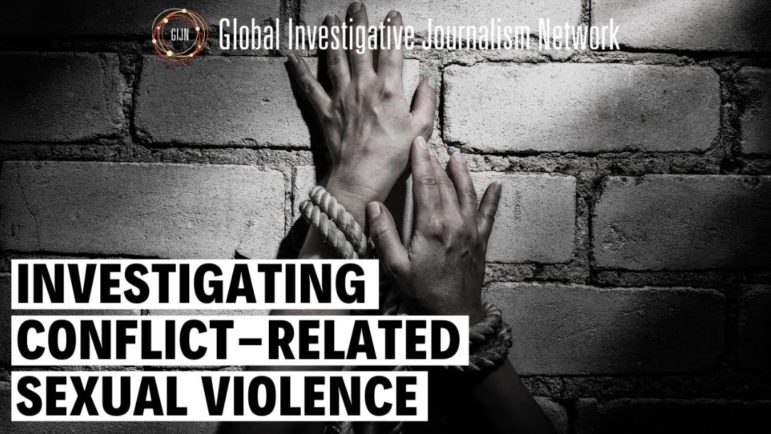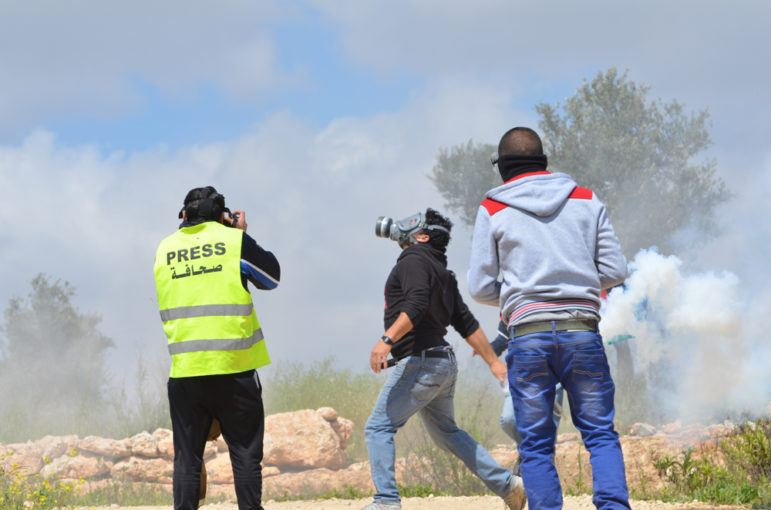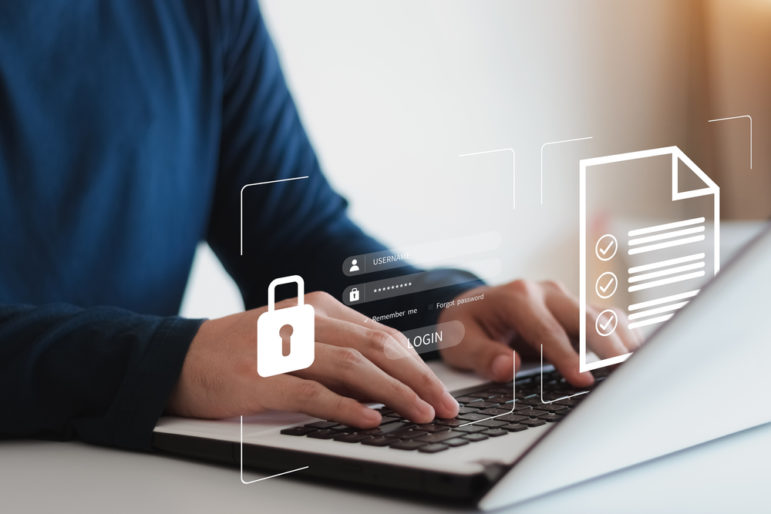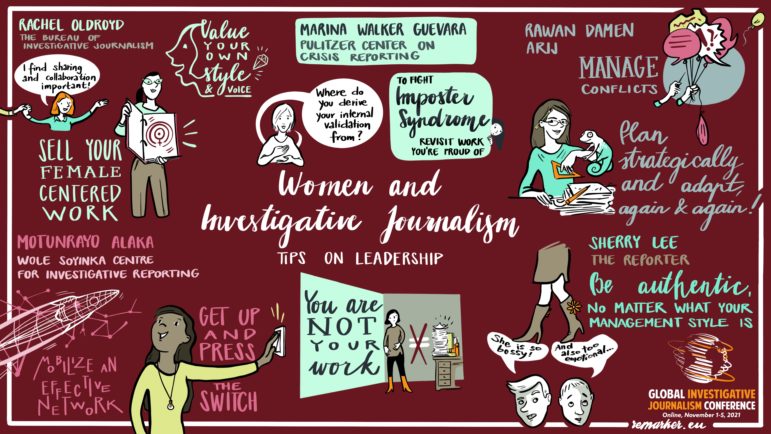

To mark International Women’s Day during a potentially tumultuous election year, GIJN’s global team spoke with women investigative journalists about their election coverage best practices. Image: GIJN
Tips From — And For — Women Investigative Journalists Reporting on 2024 Elections
Read this article in
In March 2023, Mexican investigative journalist Nayeli Roldán faced a series of cruel cyberattacks after questioning the president about the government’s alleged use of Pegasus spyware.
Around the same time, two reporters from the exiled Russian investigative news website IStories, Alesya Marokhovskaya and Irina Dolinina, received threatening messages that mentioned names, addresses, and travel plans. And in Turkey, Çiğdem Toker, a respected economic reporter with T24 news, faced digital harassment and criminal charges for comments she made during a televised program following the presidential election run-off.
Unfortunately, these cyber retaliations against women journalists are not isolated events. According to a survey of 901 journalists from 125 countries, nearly three quarters of reporters who identify as a woman said they had experienced online violence. Gender-based online violence towards journalists is further compounded when it intersects with other forms of discrimination, such as racism, homophobia, and transphobia — and can be intensified when covering certain beats.
A 2023 report by UNESCO found that threats and attacks on women journalists on social media are exacerbated when they cover political issues. Similarly, in the period immediately after Brazil’s hotly contested 2022 presidential election, 80% of the online attacks against female reporters were related to political coverage, according to a report by Abraji, a GIJN-member organization. Worse yet, a separate ICFJ report found that political actors were the second-most likely source of online attacks against women, only behind anonymous bad actors.
With four billion people in more than 50 countries — almost half the world — voting in 2024, women, transgender, and nonbinary journalists will likely face a new barrage of digital attacks, all while rising misinformation and disinformation, particularly AI-driven deepfakes, threaten elections worldwide.
To mark International Women’s Day during a potentially tumultuous election year, GIJN’s global team spoke with women investigative journalists about their election coverage best practices. They also shared tips and resources for navigating an expected increase in cyberattacks, intimidation, and other forms of gender-based violence.
1. Develop a Plan of Action — Early
Elections are often unpredictable, so journalists interested in covering global elections need to take a proactive approach. “Early planning will make sure journalists address whatever surprises emerge from the campaigning period,” said Lulu Brenda Harris, a senior reporter for the Centre for Innovation and Technology (CITE) in Zimbabwe.
When to start planning depends on your country’s election date and campaigning deadlines.
Guatemalan investigative journalist Carmen M. Valle suggests taking a strategy day to plan before the heat of election season begins. “Sit down before that date and determine what your priorities are and what your limits are,” she recommended. Although plans may change along the campaign trail, setting an initial framework can help protect against burnout and provide a roadmap to navigate a challenging political landscape.
2. Separate the Personal from the Professional
Discretion is an underrated skill. When covering elections and facing possible security issues, maintaining a divide between the personal and professional is essential.
“I have recently become even more careful about how I share information that could reveal where I live. And in my everyday life… I don’t go into detail about what I do,” said German investigative reporter Vera Deleja-Hotko. “The tone in society and towards journalists has become harsher — especially towards women.”
Often retaliation, cyber or otherwise, affects those around us, too. In our globalized, online world, it’s easy for bad actors to find and harass a reporter’s inner circle.
“When I found out that my phone was infected with the Pegasus spyware, it turned out that the same virus had been used against my family members, my friends, and people who simply surrounded me, who had no connection to politics, activism, or journalism,” said Khadija Ismayilova, editor-in-chief of Toplum TV in Azerbaijan.
Kyrgyzstan investigative reporter Meerim Ainykeeva advised investigative journalists “to avoid actively sharing personal information about family, friends, and children on social media.”
3. Consider Implementing Extra Security Measures
As we move through this year of elections, researchers are worried about misinformation developments and the impact they may have on elections. The investigative journalism community should also be concerned about knock-on safety concerns.
“Unfortunately, women and other marginalized groups are often disproportionately targeted when it comes to negative effects of new technology. That includes developments like AI deepfakes and voice spoofing,” said US freelance reporter and data journalism trainer Samantha Sunne.
Sunne said women investigative journalists should consider implementing extra security features this year, like using a password manager or random password generator. Russian investigative journalists Irina Pankratova and Ira Dolinina also suggest using two-factor authentication with a code-generating app.
Another proactive approach involves a form of digital cleaning. “Delete information that could establish behavioral patterns, for example, knowing your schedules, what neighborhood you live in, who you interact with, etc,” suggested Argentinian reporter Irina Sternik.
Belarusian investigative journalist Olga Ratmirova encouraged women to attend security training sessions to learn how to protect your information and yourself. (The third iteration of GIJN’s digital threats training course might be a good option, or our upcoming webinar on digital threats in the 2024 elections.)
4. Be Brave
Holding the powerful to account brings certain risks. But while it’s important to bear these in mind, and prepare for them as best you can, two women told us it’s important to carry on with the job as best you can.
“Every job has its own risks and threats. If you are afraid to engage in investigations, then you shouldn’t even start,” said Ukrainian reporter Maria Zemlyanska.
Ukrainian reporter Valeriya Yegoshyna said that anyone thinking of getting into investigative journalism should accept that threats and harassment can happen. “It is simply a choice to accept possible risks and not be afraid of them, while, of course, taking appropriate safety measures, regardless of gender,” she explained.
5. Seek Support
Apart from threats, intimidation, and harassment, reporters often have to contend with elements that can cause burnout or trauma, such as emotionally difficult subjects and graphic imagery. Therapy can help.
“Take care of yourself! Investigative journalism can be emotionally and mentally taxing, especially when delving into topics like gender and sex exploitation. Make self-care a priority and know when to step back and take a break if needed,” advised Kenyan journalist Catherine Muema.
Turkish journalist Çiğdem Toker echoed this point: “The support of professional organizations and colleagues is the most important resource,” she said, particularly when dealing with trolling and intimidation.
Mari Montes, a journalist from Venezuela, also highlighted the significance of receiving support from colleagues and the wider community after she became the target of a smear campaign from an online troll. “That man’s followers wrote offensive messages to me almost daily. I block those who bother me. When I made the situation public, I received support from other journalists, and that was important,” Montes told GIJN.
6. Know the Law
Whether you are probing eyebrow-raising practices during elections or simply aiming to protect yourself while working in other beats, journalists from around the globe agree that it’s important to have a strong grasp of your country’s laws.
“It’s important to be familiar with the legislation,” said Uzbekistan-based reporter Dana Oparina.
“Understand your legal rights as a journalist and be aware of the legal protections available to you,” Turkish reporter Ayşegül Engür Dahi added. “This knowledge can empower you to navigate legal challenges that may arise in the course of your investigative work.”
7. Use Your Voice
The frequent abuse of women in politics, which can be compounded by social media and often results in gendered disinformation campaigns, can be daunting. But women’s equal participation — as voters and investigative journalists — is vital for fair coverage.
“There has never been an ideal climate for journalism, which is precisely why it is necessary. In each period of history, different challenges have been faced, and the ones we face now have to do with our current technological context,” said Mexican journalist Nayeli Roldán.
Cyber pushback might also be a sign that you are on the right track, noted PolitKlinika editor-in-chief, Dilbar Alimova, adding that “time will reveal the truth.”
“My choice, as an investigative journalist and a citizen of my country, is to speak the truth loudly and persistently because I have a voice,” added Belarusian journalist Kseniya Vyaznikovtseva.
Conversely, in some contexts women investigative journalists have to fight for their place at the table.
“A lot of times my colleagues or sources told me: ‘Anastasia, no one will communicate with you on this topic. Forget it. Don’t even try.’ I was not taken seriously. Sources tried to talk to me as if I were a schoolgirl,” said BBC Russian journalist Anastasia Platonova.
Platonova’s advice? Don’t listen to anyone who tells you that something is impossible. Let the underestimation fuel your work.
8. Onward!
Women investigative journalists around the globe persevere in their work holding power to account, despite becoming the target of threats, discrimination, hatred, harassment, and smear campaigns. Pulitzer Center Executive Editor and GIJN Board Member Marina Walker Guevara summed it up best: “I am in awe, every day, of the skill, courage, and resilience of my female colleagues who are asking the toughest questions in the world’s toughest spots at a time when we need it most. Onward!”
 Holly Pate is GIJN’s Social Media and Engagement Editor. Previously, she was the Social Media and Outreach Director of The Outlaw Ocean Project, a non-profit journalism project. She has written for venues including The New York Times and The Capital News Service.
Holly Pate is GIJN’s Social Media and Engagement Editor. Previously, she was the Social Media and Outreach Director of The Outlaw Ocean Project, a non-profit journalism project. She has written for venues including The New York Times and The Capital News Service.
 Joanna DeMarco is GIJN’s Social Media Editor. She has been working in journalism in Malta for the past decade, both as a local reporter and a freelance photojournalist and has published her work in publications including Politico Europe, The Washington Post, National Geographic, and Der Spiegel.
Joanna DeMarco is GIJN’s Social Media Editor. She has been working in journalism in Malta for the past decade, both as a local reporter and a freelance photojournalist and has published her work in publications including Politico Europe, The Washington Post, National Geographic, and Der Spiegel.












